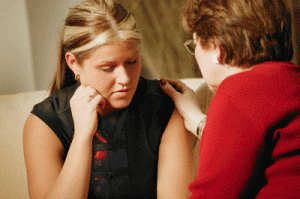Women and Binge Drinking
 The Centers for Disease Control (CDC) report that one in every eight women in the United States indulges in binge drinking, a problem that increases their risk of:
The Centers for Disease Control (CDC) report that one in every eight women in the United States indulges in binge drinking, a problem that increases their risk of:
- STDs
- Unplanned pregnancy
- Heart disease
- Accident under the influence
- Certain cancers including breast cancer
That statistic adds up to about 14 million women in the United States, and reports suggest that the average number of binge drinking sessions for each woman with a problem is three times per month. On average, these women consume six or more alcoholic beverages during each binge drinking session – far more than the recommended one drink maximum per night and almost double the number of drinks that define binge drinking, which is four drinks in a session for a female.
Drinking too much causes the deaths of 23,000 American women every year, says the January 2013 CDC Vital Signs report, yet it’s a problem that is not aggressively addressed in any arena.
How will you address the issue of binge drinking and alcohol abuse in your house? If someone you love has a problem with drinking and is unable to stop on her own, help her get the treatment she needs to limit her risk of accident under the influence and chronic health problems related to the inability to curb the habit. Contact us at The Orchid today to get more information or to begin the enrollment process for your family member.
Who Is Binge Drinking?
It may be assumed that the issue of alcoholic overindulgence is a problem relegated to lower income women in the United States but the CDC reports that that is not the case. Problematic binge drinking is most common among younger women between the ages of 18 and 34 across all income levels, and in women living in homes with an annual income of $75,000 a year or more. White women and Hispanic women report the most issues with binge drinking and alcohol in general as compared to other populations in the United States. No matter their age, ethnicity or tax bracket, all women who binge drink are at increased risk for health problems and accidents that can change their lives or end them if untreated.
Why Is Drinking a Problem for Women?
Alcoholic drinking and binge drinking is a problem for men as well as women, but women have been shown to struggle with the issue in ways that are distinctly different from their male counterparts. For example:
- Women’s bodies respond differently to alcohol than the bodies of men do. Less alcohol is necessary to get a woman drunk as compared to a man. This is due to their size relative to men and the different way in which women’s bodies process alcohol.
- Unprotected sex under the influence of alcohol can mean an unexpected pregnancy – obviously not an issue for males. If binge drinking is a chronic issue, then a woman may inadvertently damage the fetus or stunt its development with continued drinking before she realizes that she is pregnant. Additionally, if binge drinking is an addiction for her, she may be unable to quit even if continuing to drink means that her baby’s health is at risk.
- Women who binge drink are at increased risk of physical and/or sexual abuse or attack.
- Regular drinking more quickly causes chronic health problems for women as compared to men – disorders that can be deadly, including heart disease.
- Occasional binge drinking more quickly turns into alcohol addiction for women. Men who drink the same amount as frequently during the same period of time will be less likely than women to develop an alcohol addiction problem.
When Does Binge Drinking Require Intervention?
 It is relatively common for young adults in college and in their 20s to binge drink. At parties, on the weekends, at celebrations – there are a number of events in which it is culturally permissible to overindulge for all ages. However, just because it is societally acceptable, does that make it safe?
It is relatively common for young adults in college and in their 20s to binge drink. At parties, on the weekends, at celebrations – there are a number of events in which it is culturally permissible to overindulge for all ages. However, just because it is societally acceptable, does that make it safe?
No, public opinion does not transform unsafe amounts of drinking into a safe habit, but because binge drinking is an issue that it so often brushed off as normal, it can be unclear what level of negative consequences are acceptable and when it’s time to seek treatment. In general, when the negative consequences of binge drinking become overwhelming to the individual yet she is still unable to stop drinking on her own, then it’s time to choose alcohol rehab. Specifically, those negative consequences that indicate the need for medical and psychological treatment intervention include:
- Financial problems. Alcohol is not cheap, and in a social setting it can get even more expensive. The ability to pay for other things, including bills, can become problematic if the individual is unable to cut back on spending when it comes to alcohol.
- Issues at work or school. Binge drinking has immediate effects the next day. Hangovers can be problematic when they interfere with the ability to get to work or school or to perform acceptably when in attendance.
- Relationship interference. Choices made under the influence can cause problems for the drinker when she is in a relationship and the other person is unhappy with those choices or the effect that those choices have on him or her. Arguments, breakups, and divorce are common results when binge drinking is a serious and regular issue.
- Health problems. The headaches, nausea, dehydration, and other issues related to hangovers are bad enough, but it doesn’t take long for the toxic levels of alcohol to build up in the body and cause systemic problems and chronic health symptoms.
When signs of alcohol addiction arise, this too is an indicator of the need for alcohol rehab. Medline Plus says that the signs of alcohol dependence include:
- Cravings. Cravings for more alcoholic drinks in a session or cravings more drinking sessions. Many alcoholics feel that they are unable to have a good time, de-stress, or feel comfortable without a drink.
- Lack of control. When the individual feels unable to turn down a second drink after the first one or continues to drink heavily even after she is clearly feeling the effects and doesn’t “need” anymore, this lack of control over her behavior while under the influence indicates a problem.
- Tolerance. In the beginning, one or two drinks are enough to cause an effect in the drinker. She can feel drunk or relaxed relatively quickly. However, when tolerance develops, she may need four, five, six drinks or more just to feel a minimal impact from the alcohol.
- Physical withdrawal symptoms. When drinking becomes a regular behavior, the body begins to adjust to certain levels of alcohol and related toxins in the system. Should that be removed abruptly because the individual stops drinking, it can mean physical withdrawal symptoms which are an undeniable indication of a level of dependence that indicates a serious problem with alcohol that should not be ignored. Treatment is the necessary next step.
Help Is Available for Binge Drinking
If someone you love is struggling with binge drinking or any form of alcohol abuse or addiction, don’t wait to call. Every day that they continue to binge drink or drink addictively is a day that they risk an accident under the influence, poor choices that can alter the course of their life, arrest, or worse. Our intensive treatment program here at The Orchid can provide the healing and rehabilitation your loved one needs to stop drinking immediately so she can learn how to build a new life in sobriety. Call now for more information.
